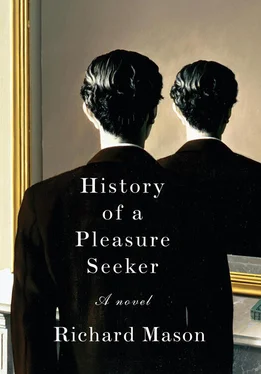Piet had asked no such question.
“What’s wrong with Africa? You tell me. It’s bloody hot and there are too many darkies standing about with nothing to do. Well, I can fix all that. Chum of mine, dashed clever chap, had an idea about refrigeration. I bought the rights off him. There’s a fortune to be made.”
As they went back to their cabin, Percy expanded on this theme. “You build a cube out of chicken wire, then a bigger cube around it. Fill the gap with charcoal. Get a darkie to pump water over the charcoal on the half hour. As the water evaporates, the space inside the smaller cube cools. Quite good enough for most foods.” He began to sketch this invention for Piet. He was not a talented draftsman. Soon the paper was covered in squiggles and arrows. Percy’s eyes were shining with a convert’s conviction. “See?”
Piet said that he did see.
“Can’t fail, won’t fail.”
It was a relief to Piet that Percy’s interest was wholly self-focused. When they went to dinner two hours later, he was still talking. Like their cabin, their table was small and inconveniently situated just behind the swing doors. The two other passengers assigned to it were an English lady named Miss Prince, going out to teach at a mission school, and a German widow whose recent bereavement appeared to have left her buoyed and cheerful. Their common language was English, since this was all that the two English people spoke. Piet’s was proficient, Frau Stettin’s less so, which meant that the burden of conversation with the others fell on him.
A wicked look or smile at the hideousness of it all from Miss Prince might have lifted Piet’s spirits, but in fact she seemed rather impressed by Percy Shabrill.
He was sitting with his back to the wall and had a full view of the dining room. There were no bare boards, as in third class. There was a carpet and electric light, but for all that it was dingy and overcrowded and for some structural reason its roof was supported by pillars every few feet, which made it claustrophobic and cramped. His fellow passengers were dressed with the careful pretension of the rising middle class. They seemed greatly pleased by everything, as he might have been had he never met the Vermeulen-Sickertses or grown accustomed to their way of life.
But he had, and this robbed him of the naïveté necessary to delight in the second rate.
Other disadvantages swiftly emerged. Piet yearned for solitude, but this was not available to a man in a shared cabin on the Eugénie . Percy’s constitution was delicate and he spent much of each day in bed. A full complement of 450 tourist-class passengers left the public rooms crowded, as the decks were too except in the foulest weather; and an unwritten convention entitled anyone to strike up a conversation on the slenderest pretext.
Frau Stettin was the least unbearable of his new acquaintances, because she was artless and sincere and happy to talk with very little prompting. Her cheerful voice, rambling on irrelevancies, was a soothing distraction from his self-reproach, and Piet exerted himself to inquire after her grandchildren and to remember their names and ages, with something of his old attentiveness. Miss Prince’s moods were highly erratic. Only a disciplined childhood in a Warwickshire vicarage had trained her to present to the world a façade of calm, conventional womanhood. This façade expertly achieved, her conversation contained nothing to snag Piet’s interest and meals eaten at her side passed slowly. He spent one afternoon expressing polite approval of the textbooks with which she intended to teach native children English. It appeared that she and her father had devised them and paid for their printing. “One so wants to help the kaffirs to be useful . Deep down, that is what they wish for themselves,” she said, opening a section titled “Phrases for the Home” which included the constructions May I direct you to the drawing room? and Her ladyship is indisposed .
“It would be hard for a kaffir to manage without such knowledge,” he observed, thinking how unjust it was that this woman should have the freedom denied to Louisa Vermeulen-Sickerts. Miss Prince detected nothing at all ironic in his tone and prattled on, warming to her theme of native self-improvement. As he listened to the stories of her colonial acquaintances’ troublesome servants, and the importance of training their children to do better, he searched the room for someone to share and appreciate the ghastliness of his situation, but confronted nothing but well-scrubbed faces beaming good cheer.
Percy Shabrill’s voluble self-certainty, even when gripped by seasickness, sapped Piet’s remaining reserves of optimism. It seemed a dangerous folly to be crossing the world without an idea of what he would do at the other side, and this thought preoccupied him as he played bridge with Frau Stettin or listened to Miss Prince’s theories on education. Though he had vowed to spend no money on board, restraint was difficult in practice. Only the food was included in the price of passage. When a steward appeared after dinner with a tray of brandies, already poured, it was embarrassing to refuse. He accepted one, and when the others exclaimed over its excellence he did not tell them how awful it was.
On the third day out there was a violent storm. The impact this had on Percy was briefly cheering. It pleased Piet to see him laid so low and for once the reading room was empty after lunch. But the next day, as they passed through the Bay of Biscay, the seas calmed and the crowds returned. He woke early, roused by the rattling of his cabin. The ship was picking up speed and with each knot the vibrations grew more violent. One of the shelves was inadequately screwed to its bracket and clattered unendurably.
He dressed and went to breakfast, followed by his grumbling cabinmate. The eggs were fried in the English manner and had been left too long in the warming tray. As he sawed into one he observed that Percy and Miss Prince had taken a close interest in each other, and their clumsy flirtation was as irritating as the rubberized yolk. Piet spent the morning playing piquet for low stakes and losing. Then he went to his cabin. It was mercifully empty. He lay down on his bunk and closed his eyes.
Piet had not cried since his childhood, but when Percy opened the door ten minutes later he felt briefly as though he might. Percy was speaking of Miss Prince in low, ardent tones. He gave every sign of taking Piet into his confidence until lunch. Piet excused himself and went on deck, past the ranks of deck chairs, the shuffleboard players and strolling couples. At the aft section was a spiked trellis, separating tourist from the roomier portion assigned to first class. He went there and leaned over the rails, staring at the sea. His expression was so tragic that a bold little girl asked if he was all right.
“Thank you,” he said. “My eyes are just stung by the wind.”
And then he heard his name.
Like a wish granted by a fairy godmother, Didier Loubat had materialized not two feet away. In a tailcoat with the line’s shell and crossed L s on the lapel, he was standing on the other side of the barrier. His hair was shorter than he had worn it at Herengracht 605. He looked older and more glamorous.
“Don’t show you know me.” He took a soft cloth from his pocket and polished a spot of rail. “You look awfully glum.”
“I am.”
“Life on board not up to your standards?”
Piet turned out to sea, as if unconscious of his friend’s presence. “It’s dreadful in every possible way. I should have gone steerage and saved my money.”
“I can change your mind about that.” Didier returned the cloth to his pocket. “You can’t see any part of steerage from first class, and it has no open deck. If you’d been in there I’d never have found you. As it is, I’ve been freezing my balls off hoping to catch sight of you.” He began to fold up a deck chair, pretending to have trouble with it. “Now listen carefully. The tourist-class reading room will be empty while everyone’s at lunch. If you go through the service door outside it in twenty minutes, you’ll find yourself in a corridor with a grille gate at one end. I’ll meet you there. Go to your cabin and put on a better tie.”
Читать дальше












